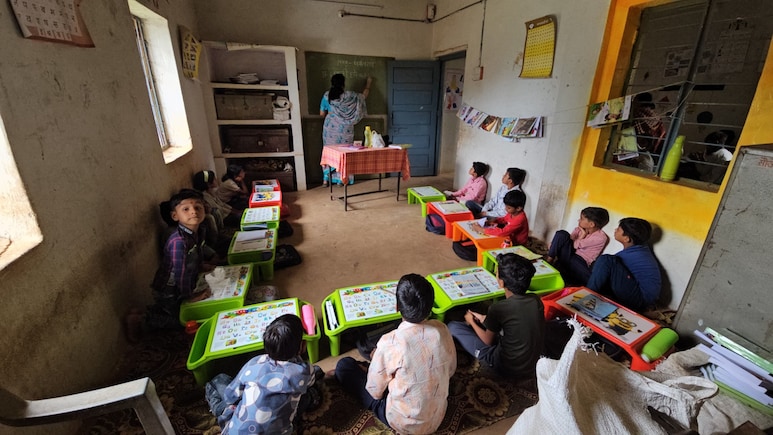
- More than 12,000 government schools in Madhya Pradesh are run by a single teacher
- Primary teachers must now also handle early childhood education with minimal training
- A 2024 report shows 9,500 schools lack electricity and 5,600 schools have no buildings
More than 12,000 government schools in Madhya Pradesh are being run by a single teacher. Amidst an acute and growing shortage of teaching staff, the state government has issued new instructions that deepen the crisis even further. Now, primary school teachers already burdened with multiple responsibilities are being instructed to also handle early childhood education for Anganwadi children, after undergoing minimal training.
A letter issued by the State Education Centre, a copy of which is with NDTV, lays out detailed instructions for operating Balvatika (pre-primary) classes during the 2025-26 session. It mandates that trained teachers must conduct these classes, implement a structured timetable, manage play-based learning, track student progress, and create handmade learning materials all while ensuring regular monitoring, including uploading videos and reports to dedicated groups. Teachers must also prepare local newsletters and act as storytellers, caregivers, and evaluators.
In districts like Agar Malwa, 200 kilometers from the state capital Bhopal, this so-called 'management' is unraveling at the seams. In one government primary school, just three teachers are responsible for handling eight classes from nursery to fifth all in overlapping shifts and cramped spaces. One of them is Rekha Bhatnagar, who often finds herself attending to toddlers while older children wrestle with math and grammar in the same room. These teachers aren't just educating they're feeding children, comforting crying ECCE students, managing mid-day meals, and still expected to implement the New Education Policy's vision of "play-based learning." The role demands more than teaching: it demands emotional labour, time management, and an ability to multitask like a full-time caregiver and administrator rolled into one.
"We're managing," Rekha says, gently, as she soothes a four-year-old clinging to her saree. "They're too young, some cry for their mothers. We sing to them, feed them, give chocolates when they won't settle." Her words are calm, but they speak volumes this is not a classroom, it's a space of survival.
The state dreams of joyful, creative classrooms. But what "play-based learning" often translates to is: the teacher must "play," manage the "base," and still make "learning" happen. ECCE implementation, primary instruction, mid-day meals, emotional regulation, and daily documentation all now expected from just three people. The government isn't asking them to teach anymore; it's asking them to perform magic, every single day, without backup.
Principal Saroj Mangal defends the effort: the staff is doing its best, the ECCE kids are seated with Class 1 and 2 due to the lack of classrooms and teachers. The portal is being updated, he says. But the facts on the ground speak louder. According to a 2024 central government report presented in the assembly, there are still 12,210 one-teacher schools in Madhya Pradesh a slight improvement from the 21,077 flagged by UNESCO in 2021, but still a grave figure for a state with around 1 lakh schools.
The same report paints a bleak picture: 9,500 government schools without electricity; 1,745 without toilets for girls; 775 without ramps for children with disabilities; and of the 4,815 "smart classes" approved, only 986 actually function. Worse, 5,600 schools are either in ruins or have no buildings at all. Enrolment has also nosedived from 78.96 lakh students in 2015-16 to 58.17 lakh in 2024-25 a decline of 21 lakh in just a decade. Students aren't simply dropping out they're being pushed out of a system that has stopped working for them.
Congress MLA Jaivardhan Singh calls it outright neglect. "Vacant posts are not being filled. Guest teachers are underpaid and left in limbo. Permanent recruitment remains stuck in files," he says. "Teachers are our most valuable resource and we are burning them out."
In contrast, the state's School Education Minister Rao Uday Pratap Singh dismisses these concerns entirely. "Your information is wrong," he says. But principals, teachers, district officials and the government's own data suggest otherwise.
But when NDTV questioned the District Education Officer, his statement clearly contradicted that claim. MK Jatav, DEO Agar-Malwa, said, "Only those teachers who are already posted have been trained. They are generally trained to do prayers, figures from pictures, basic counting knowledge for small children, and small poems like Machhli Jal Ki Rani Hai. Anyway, the workload on teachers is already high, so this won't increase it much. We just follow the department's instructions."
In Madhya Pradesh today, teaching is no longer a profession. It's a test of physical and emotional survival. Teachers are expected to be routers for a broken system everything flows through them, but nothing supports them. They cook, clean, record data, handle trauma, manage toddlers, and now, train as ECCE specialists too.
Track Latest News Live on NDTV.com and get news updates from India and around the world

